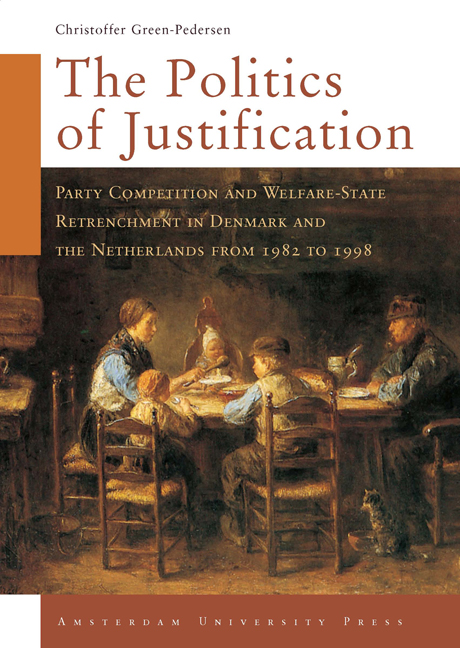 The Politics of Justification
The Politics of Justification Book contents
- Frontmatter
- Acknowledgments
- Contents
- List of Abbreviations
- 1 Introduction
- 2 From Theories of Expansion to Theories of Retrenchment
- 3 Framework for Government Choice on Retrenchment
- 4 Research Strategy and Research Design
- 5 Retrenchments in Denmark and the Netherlands
- 6 Dutch Politics and Welfare-State Retrenchment.How Party Competition Produced Consensus
- 7 Danish Politics and Welfare-State Retrenchment:The Difficulties of a Right-Wing Government and the Possibilities of a Left-Wing Government
- 8 The Evidence on Balance and some Quibbles
- 9 Party Politics Matter – Summary and Implications
- Appendix
- Summary
- Notes
- References
- Index
1 - Introduction
Published online by Cambridge University Press: 15 January 2021
- Frontmatter
- Acknowledgments
- Contents
- List of Abbreviations
- 1 Introduction
- 2 From Theories of Expansion to Theories of Retrenchment
- 3 Framework for Government Choice on Retrenchment
- 4 Research Strategy and Research Design
- 5 Retrenchments in Denmark and the Netherlands
- 6 Dutch Politics and Welfare-State Retrenchment.How Party Competition Produced Consensus
- 7 Danish Politics and Welfare-State Retrenchment:The Difficulties of a Right-Wing Government and the Possibilities of a Left-Wing Government
- 8 The Evidence on Balance and some Quibbles
- 9 Party Politics Matter – Summary and Implications
- Appendix
- Summary
- Notes
- References
- Index
Summary
The development of modern welfare states is an issue that has attracted enormous attention within social science. One could easily fill an impressive library with books and articles about the issue. The reasons for this interest are straightforward. The welfare state is a highly important phenomenon in Western societies. It strongly influences the life of nearly the entire population in the Western world. Thus, researchers interested in different subjects such as gender relations (e.g. Lewis 1992; Orloff 1993) or poverty (e.g. Korpi & Palme 1998) automatically come to focus on the welfare state.
Until about 20 years ago, studying the development of modern welfare states was synonymous with studying their growth. This no longer applies. Welfare-state retrenchment has been on the political agenda of most of the rich oecd countries for the last 20 years, and almost all countries have experienced welfare-state retrenchments (Stephens, Huber, & Ray 1999). This has been part of a larger attempt of Western societies to adjust their models of welfare capitalism to a changed economic environment (cf. Kitschelt et al. 1999; Regini 2000; Scharpf & Schmidt 2000a). Evidently, the recent development of modern welfare states has also affected the scholarly interest. Research into welfare-state growth is still ongoing (e.g. Hicks 2000; Iversen & Cusack 2000; Mares 2000; Huber & Stephens 2001a). However, starting with Pierson's (1994; 1996) groundbreaking studies of welfare-state retrenchment in primarily the United States and Britain, a scholarly debate about retrenchment has gained momentum.
This book is an investigation of retrenchment in Denmark and in the Netherlands during the period 1982 to 1998, focussing on retrenchment of old-age pensions, unemployment benefits, and disability pensions/early retirement benefits. The general aim of the book is to contribute to the scholarly debate about welfare-state retrenchment in a number of ways. The main aim is to add to the knowledge of the factors causing variation in retrenchment between countries and across social-security schemes. Here, the argument of the book is that politics is the main factor causing variation. In this way, the book differs from most other writings on retrenchment that follow the new institutional wave within political science in general, highlighting the role of institutional factors.
- Type
- Chapter
- Information
- The Politics of JustificationParty Competition and Welfare-State Retrenchment in Denmark and the Netherlands from 1982 to 1998, pp. 13 - 18Publisher: Amsterdam University PressPrint publication year: 2002


